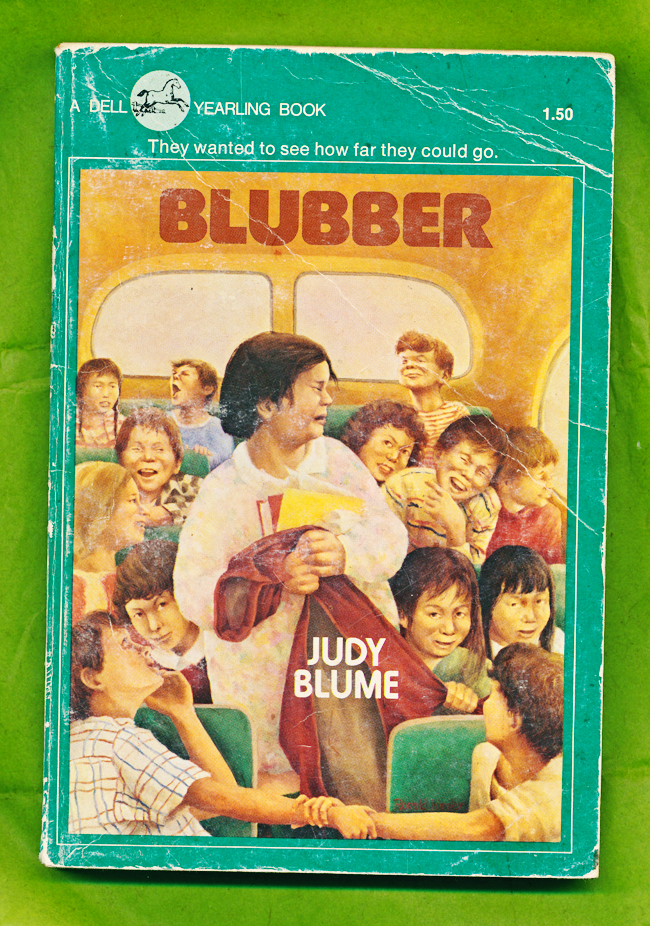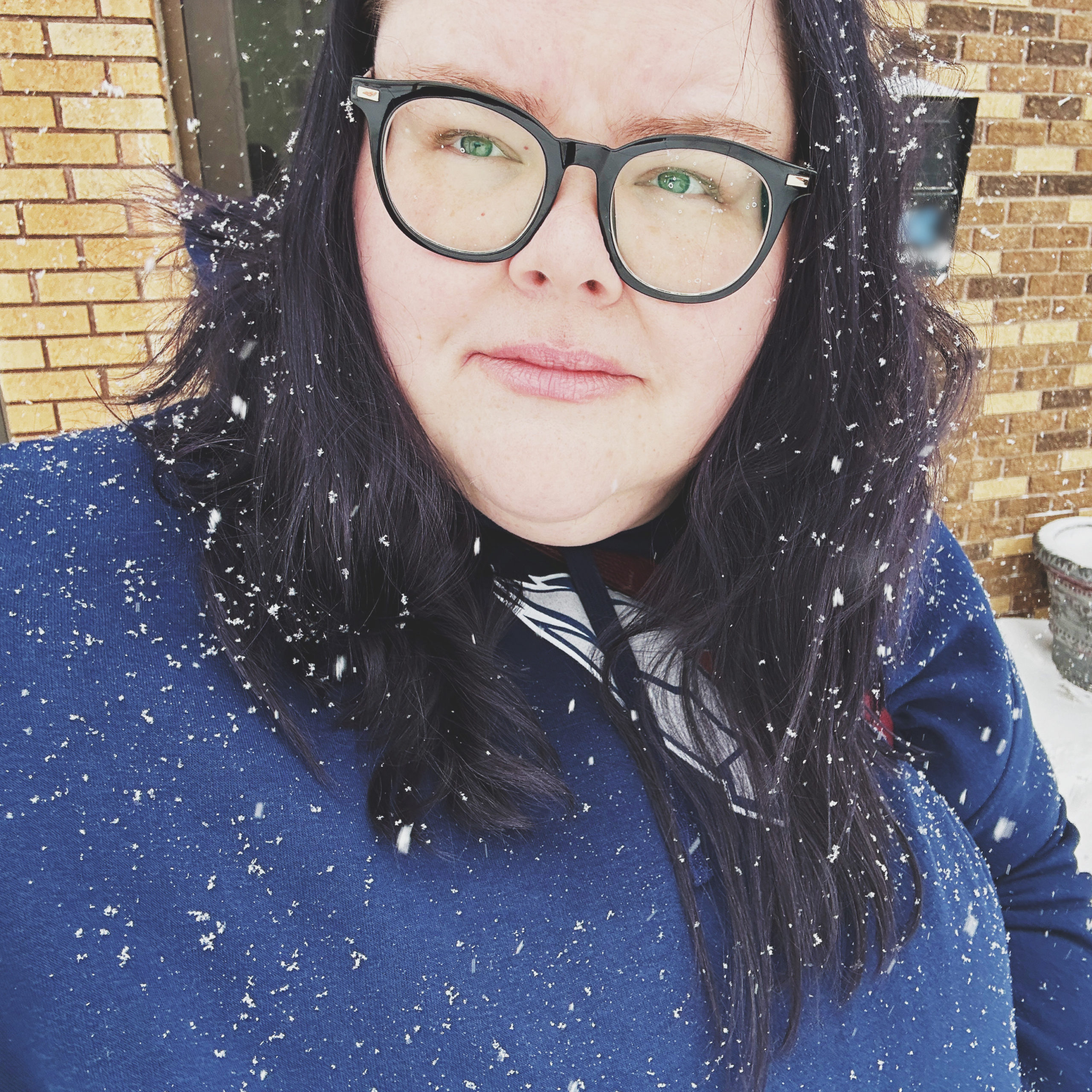Dear Judy,
Reading Blubber was not a fun experience. That’s usually a sign of a book that has affected me in some way, so that’s not necessarily a harbinger of doom or anything. But, let me tell you, it’s not not either.
I am fat, Judy. Extremely fat! Death fat. The kind of fat that they crop the heads off of on the news while talking about the OBESITY EPIDEMIC that apparently has a death grip on the entire United States. I was a fat kid, a fat adolescent, a fat teenager, a fat adult, a fat undergrad, a fat substitute teacher, a fat grad student, a fat unemployed writer, and I’ll probably someday die while fat. I will likely always be fat. And, Judy, though I know it’s not the dominant opinion, there’s nothing wrong with being fat.
I don’t think you hate fat people, Judy, but you sure do like to have your characters worry over their weight and the weight of those around them. This is a symptom of adolescence. I experienced it too! From both sides. And I wish, just once, your characters would learn that there’s nothing wrong with being fat. I wish Linda hadn’t dieted. I wish she’d stood up to the cruelty of her classmates, instead of joining in on it when it was foisted on someone else. I wish Jill had stood up for her. I wish someone had said, “Who cares that she’s fat! Let’s all stop being assholes!” But they didn’t. And that’s a massive bummer.
I won’t go in to all the things I’ve learned from being part of the fat acceptance movement. I won’t talk about the ways in which we ostracize and other fat people, the way we use their bodies as metaphors for greed and materialism. I won’t talk about the ways in which weight has little to do with health and how people can be healthy at every size. I won’t even talk about how weight and health are not morals and how being healthy doesn’t make you a good person or how people who are fat and unhealthy are just as deserving as respect and humanity as people who are fat and healthy or thin and healthy or thin and unhealthy. I won’t even really talk about how we are all deserving of respect, bodily autonomy, and a life free from body shame. And how all of those things are important lessons, not just for fat people, but for everyone.
Well, I guess I did talk about all those a little.
But what I really want to talk about is how, thus far, your books have offered moments of safety and surety for weirdos, Judy. Your gift as a writer is giving young people lively characters with whom they can find shelter, comfort, and camaraderie. Margaret and Deenie and Sheila and Tony and Karen all suffer the same pains and embarrassments and fears that real live adolescents do and you capture them with care and honesty. Your characters learn lessons from their mistakes and become better people. Because of that, your books act as both tools for learning and comforts, like a childhood blanket or stuffed animal when we’ve gotten too old to cling to them.
What I want to talk about is how Blubber doesn’t comfort anyone. It doesn’t teach anyone. It doesn’t provide an example of a decent human being or show us how not to be like those who do wrong. These children, including Jill in whose perspective we have been mired, are terrible. They’re cruel and hateful and vicious. They tear Linda down until she is literally berating herself unprompted in order to perform the normal functions of her day unabused. I hoped that Jill would stand up for her in the beginning and then I hoped that Jill would learn a lesson from her own foray into bullying and then I was just left to desperately hope that she would at least understand what she had done to Linda because she was suffering it herself. But she doesn’t. She learns a lesson about… not caving to bossiness?
I’m not saying that Blubber isn’t honest. Kids are terrible, horrible, monstrous creatures that go straight for your weakness like a wolf with a vulnerable jugular, but fiction, especially fiction targeted toward young audiences, should be aspirational. It should hope for a better world full of engaged, empathetic humans who don’t want to cause injury to one another.
I was a fat kid who took an enormous amount of abuse from my classmates. I was also a fat kid that fought back, who bullied back, who laughed it off even when it was too much to take. I understand Linda’s decision to join the other side, to seek shelter from the storm deep in the clouds.
What I cannot understand is why Jill learns so little. Children are capable of empathy, often far more than adults are, and yet she remains callously impervious to the plight of her classmate. It’s so hard to watch Jill become Baby Brenner with so little recognition that this is almost exactly what she was just perpetuating alongside her friends. How she can be so outraged at the abuse Tracy receives because of her race and yet be unable to process that to the cruelty she herself commits?
I can’t imagine having been eight or nine or ten or, hell, twelve and reading Blubber and feeling anything other than scorned and hated and miserable. A book like this should be for the Blubbers and the Tracys and the kids who are emotionally brutalized by the world around them. But Blubber isn’t for those kids, it’s for the Jills and the Carolines and the Rochelles. It’s for the ones who refuse to stand up when other people are being hurt. It’s for the ones who say, “There are some people who just make you want to see how far you can go.”
I can’t understand it, Judy. I just can’t.
– Ash

